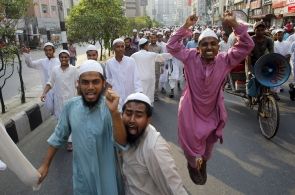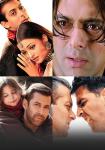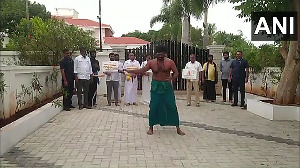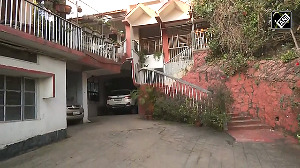 A prominent lawmaker of the opposition Bangladesh National Party was on Tuesday sentenced to death by a special Bangladeshi tribunal for genocide during the country's 1971 liberation war against Pakistan, becoming the first Member of Parliament and seventh person to be convicted of crimes against humanity.
A prominent lawmaker of the opposition Bangladesh National Party was on Tuesday sentenced to death by a special Bangladeshi tribunal for genocide during the country's 1971 liberation war against Pakistan, becoming the first Member of Parliament and seventh person to be convicted of crimes against humanity.
"He (Salauddin Quader Chowdhury) will be hanged by neck till he is dead," Justice ATM Fazle Kabir, chairman of the three-member International Crimes Tribunal, announced in a packed courtroom.
Chowdhury, 65, the first member of the main opposition BNP to be tried by the court, was found guilty of rape, torture, murder and genocide during the war of independence.
Despite tight security across the country, the verdict sparked violence in Chowdhury's home city of Chittagong and in capital Dhaka, with protesters torching vehicles. A driver of a van that was set afire sustained burn injuries.
The government had on Monday boosted security in anticipation of violent protests by opposition parties. Paramilitary Border Guards were deployed in Chittagong, while police in riot gear patrolled the streets in the capital and other cities.
BNP called for a dawn-to-dusk strike in the port city of Chittagong on Wednesday to protest the verdict.
Earlier, the tribunal said nine of 23 charges against Chowdhury, who was present in the courtroom with family members, were "proved beyond reasonable doubt" and he was awarded capital punishment for four of the charges.
The judges took more than two-and-half hours to deliver the 172-page verdict along with observations.
"The verdict is justified...he was given death penalty on four charges which were heinous genocides," Attorney General Mahbubey Alam said, emerging from the courtroom.
Witnesses said Chowdhury called the verdict "a pre-determined judgment" and his relatives joined him in ridiculing the judges.
Chowdhury is one of two BNP leaders to be tried for 1971 war crimes, but the top leadership of the main opposition party was yet to comment on the verdict, which came 17 months after the high-powered tribunal indicted him on 23 charges of crimes against humanity committed along with Pakistani troops.
The charges included killing 200 people, collaborating with the Pakistan Army to kill and torture unarmed people, looting of valuables and torching of houses and other properties and persecuting people on religious and political grounds
Grabbing of Hindu households and forcing members of the minority community to leave the country were the other charges against him.
Today's landmark verdict came weeks after anonymous calls threatened that Bangladesh would go up in flames if Chowdhury was given the death penalty.
Chowdhury's lawyers said they would appeal against the verdict in the Supreme Court as he did not get any justice from the tribunal.
Meanwhile, the ruling Awami League and its ally Workers Party of Bangladesh expressed satisfaction over the verdict of Salauddin Quader. League's Joint General Secretary Mahbubul-ul-Alam Hanif said the verdict had fulfilled the expectations of the nation.
Hundreds of 1971 veterans and youths, who earlier rallied at nearby Shahbagh intersection to enforce a vigil, celebrated the verdict by chanting 'Joy Bangla', the slogan of freedom fighters during the liberation war.
Chowdhury is a member of BNP's highest policy-making standing committee. The son of former acting president and parliamentary speaker of Pakistan Fazlul Quader Chowdhury, Chowdhury served as the adviser of parliamentary affairs to Khaleda Zia when she was premier during 2001-06.
Chowdhury, who served as a Member of the Parliament for six terms, hit the headlines for his ridiculing gestures and arrogant comments during his trial. His actions even resulted in the hearing being halted several times.
During the trial, he questioned the authority of the tribunal, ridiculed the court by comparing it to a circus, and twice fired his lawyers' panel, but later reinstated them.
The BNP leader also said he was born in a Chittagonian Muslim family, not in a Bengali family and his mother tongue was Chatgaian (Chittagong's local language), not Bangla.
He also examined prosecution witnesses at times, discarding his counsel.
Witnesses said the tribunal described Chowdhury's attitude towards law as unbecoming for a lawmaker who was elected to parliament six times, but added that the panel did not consider his behaviour while finalising the verdict.
Chowdhury was arrested on the eve of Victory Day celebrations on December 16, 2010, in line with the tribunal's order. He was the second accused to be indicted since the war crimes trials began three years ago.
He was suspected of masterminding the 1971 killing of Nutun Chandra Singha, a respected philanthropist and industrialist in Chittagong. He was also accused of running a "torture cell" at his paternal house in the port city.
Image: Activists of Hefajat-e-Islam shout slogans as they rally in Dhaka. The activists demanded capital punishment for a group of bloggers, who organised the recent Shahbagh demonstrations, and the introduction of blasphemy laws, according to local media ' Photograph: Andrew Biraj/Reuters










 © 2024 Rediff.com -
© 2024 Rediff.com -